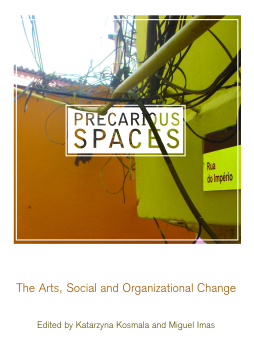
Additional Information
Book Details
Abstract
Precarious Spaces addresses current concerns around the instrumentality and agency of art in the context of the precarity of daily life. The book offers a survey of socially and community-engaged art practices in South America, focusing in particular on Brazil, and contributes to the debate about the possibility for change through social, environmental and ecological solutions. The chapters present a wide spectrum of contemporary social agency models with an emphasis on detailed case studies and local histories. Chapters feature critical reflections on the spaces of urban voids, derelict buildings, self-built communities such as favela, and roadside occupations.
Table of Contents
| Section Title | Page | Action | Price |
|---|---|---|---|
| Cover | Cover | ||
| Half Title | i | ||
| Title | iii | ||
| Copyright | iv | ||
| Contents | v | ||
| Acknowledgements | vii | ||
| Preface | ix | ||
| Part I: Introducing the Volume | 1 | ||
| Chapter 1: Why precarious spaces? | 3 | ||
| Chapter 2: How emergent cultural imaginaries of autonomy and planetarity can reframe contemporary precarity debates | 15 | ||
| Part II: Emancipating: The Arts and the Possibility of Change | 35 | ||
| Chapter 3: From the precarious to the hybrid: The case of the Maré Complex in Rio de Janeiro | 37 | ||
| Chapter 4: Painting free from gentrification: Participatory arts-based interventions in the favelas of Rio de Janeiro | 61 | ||
| Chapter 5: Beyond aesthetics: Poetics of Autoconstrucción in Mexico City | 87 | ||
| Chapter 6: FOLi Lab: A museographic urban experiment at the Biennial of Photography in Lima, Peru | 113 | ||
| Chapter 7: OrgansparkZ: Communities of art-space, imagination and resistance | 131 | ||
| Part III: Resisting: Opening Organizations, Altering Organizing | 153 | ||
| Chapter 8: Pockets of resistance: A look at the Mbyá-Guarani camps in Rio Grande do Sul, Brazil | 155 | ||
| Chapter 9: Fábricas Recuperadas in Brazil: Contextual experiences | 173 | ||
| Chapter 10: New technologies and media activism in Brazil: Reassembling spaces in the context of innovation | 195 | ||
| Chapter 11: Organizing culture in favela Fluminense in Rio de Janeiro: The dynamics of precarity | 211 | ||
| Chapter 12: A much mended thing: Notes from the North | 229 | ||
| Notes on contributors | 245 | ||
| Back Cover | 251 |
